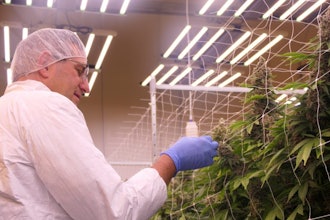
An interdisciplinary team of researchers at Penn State is part of a project that recently received a $1 million National Science Foundation (NSF) Engines Development Award. The award will fund the development of the Pennsylvania Industrial Hemp Engine (PAIHE), which will support the manufacture and deployment of bio-based products for application in green building construction, packaging, fabrics, renewable energy and land remediation.
Launched by NSF’s new Directorate for Technology, Innovation and Partnerships, the Engines Development Award aims to help partners create economic, societal and technological opportunities for their regions. PAIHE is one of 44 projects funded nationally in this inaugural round of awards.
“The launch of the Pennsylvania Industrial Hemp Engine reflects Penn State’s commitment to groundbreaking research and to fostering economic development that enriches and empowers our commonwealth, both of which are at the core of our mission as a 21st-century land-grant university,” said Penn State President Neeli Bendapudi. “This is an effort undertaken in partnership with business, agriculture, government and fellow institutions of higher education — demonstrating the transformative power of public-private partnership and collaboration across industries and disciplines. I am grateful for the support of the National Science Foundation, and for the many partners who are helping make this important work possible.”
Penn State is partnering with Vytal Plant Science Research (VPSR), a nonprofit biotechnology corporation based in Hazleton, Pennsylvania; Emory University; Wharton School of Business; Ben Franklin Technology Partners; the Pennsylvania Department of Agriculture; and several farms and private industries throughout the state to launch PAIHE.
“We are excited at Penn State Harrisburg to be able to leverage our long-term investment in plant genetics and biofuels research, development of public-private partnerships, and increased collaborations across Penn State to engage in this transdisciplinary research in response to NSF’s Engines program,” said Vahid Motevalli, interim vice chancellor for academic affairs at Penn State Harrisburg.
Sairam V. Rudrabhatla, professor of biology in Penn State Harrisburg’s School of Science, Engineering and Technology, will serve as institutional principal investigator on the project. Ali Memari, the Bernard and Henrietta Hankin chair in Residential Building Construction and director of the Pennsylvania Housing Research Center at Penn State, is co-principal investigator. Catherine Rios, associate professor of communications and humanities in Penn State Harrisburg’s School of Humanities, serves in a leadership role on the Diversity, Equity, Inclusion, and Accessibility committee of the project.
The project’s goals include developing a sustainable supply chain of industrial hemp to meet global demand for renewable hemp-based recyclable products; recommending use-inspired research, market and supply chain development strategies; identifying funding incentives to develop key infrastructure, education programs, product innovation, and manufacturing; and reducing greenhouse gases through the use of carbon capture strategies, said Rudrabhatla.
“From farming and agricultural technologies, research and manufacturing, innovation leadership and workforce development, community development and policy advocacy, and a fully integrated mission of diversity and inclusion, the engine will connect established and emerging regional stakeholders to address today’s challenges and build opportunities for a new generation of hemp agriculture and hemp innovation in Pennsylvania,” Rudrabhatla said.
Visit the project website for more information.






















